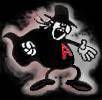
The Anarchist Encyclopedia: |

The Anarchist Encyclopedia: |

Tony Gibson
Biographical/historical note : British anarchist; as a BBC producer of programmes on youth groups and social workers interested in action groups in local communities and neighbourhoods; head of the Department of Psychology at Hatfield Polytechnic; author of ‘People Power: community and work groups in action' 1979, of ‘Kindling the Phoenix Nest. Interviews with pioneers of anarchism in post-war Britain' and of publications on the emotional and sexual lives of older people.
Source: International Institute of Social History Archives, whose contents include:
Correspondence and some transcriptions of his interviews with Cyril Cannon, Nicholas Comfort, Rudolf de Jong, Sid Parker, Vernon Richards, Donald Rooum, Harold Sculthorpe, Rufus and Sheila Segar, Jack and Mary Stevenson, Colin Ward, George Woodcock and others 1977-1998; other documents relating to his research for ‘Kindling the Phoenix Nest. Interviews with pioneers of anarchism in post-war Britain'.
OBITUARY
Hamilton Bertie 'Tony' Gibson, psychologist and anarchist
born October 14 1914; died March 22 2001Tony Gibson
Conscientious objector who became the smooth image of the RAF
Donald Rooum and Rufus Segar
Monday April 30, 2001, The GuardianIn 1939, the society photographer, Howard Coster, was commissioned to portray a handsome young man to advertise the hair gel Brylcreem. His choice was HB "Tony" Gibson.
In those days Tony, who has died aged 86, was eaking out a living posing for art school life classes. His habitually uncontrolled black hair was made neat and shiny for the advertisement, thanks to one of Brylcreem's competitors - the barber had no Brylcreem. By 1940, one of the ensuing portraits was being used repeatedly in full-page magazine advertisements. During the Battle of Britain, thanks to retouching, the "Brylcreem Boy" was given a Royal Air Force uniform. Meanwhile, Tony was in prison - as an unregistered conscientious objector.
By 1940, one of the ensuing portraits was being used repeatedly in full-page magazine advertisements. During the Battle of Britain, thanks to retouching, the "Brylcreem Boy" was given a Royal Air Force uniform. Meanwhile, Tony was in prison - as an unregistered conscientious objector.
Cream of the crop... Gibsons picture
in a wartime Brylcreem advertisement
from the Illustrated and Sporting News.
In real life, Tony was an anarchist, a psychologist, the first president of the British Society of Experimental and Clinical Hypnosis, the inventor of the Gibson spiral maze psychomotor test, and the founder of the psychology department at Hatfield Polytechnic, now the University of Hertfordshire.
Born in Romford, Essex, the son of a wealthy family and the youngest of seven children, he absconded from Cranleigh school, in Surrey, at the age of 16 and, after living on the streets of Soho and Bloomsbury, was briefly a medical student at King's College London, until his father cut him off without a penny. Then came the life class modelling, the ads - and jail.
At that time, Tony and his lifelong companion, Betty Gibson, were members of the Forward Movement, an anarchist group within the Peace Pledge Union. He served three prison sentences, the maximum permitted for refusing military service. Thereafter, he worked as an ambulance driver and an agricultural labourer, and was one of the temporary editorial team of the anarchist newspaper War Commentary, when most of the regular staff were imprisoned in 1945.
From then until 1954, he and Betty worked at the progressive Burgess Hill school, in Hampstead. During this period, Tony's father died intestate, and his estate was distributed - so the estranged son came into money once again, which enabled him to resume his education, at the age of 40.
Having graduated with first-class honours in sociology from the London School of Economics, he studied psychology and clinical psychology, and became a research assistant at the Institute of Psychiatry, in south London, studying hypnotism in a three-strong team with Professor Hans Eysenck and Desmond Furneaux. Tony did most of the hypnotising.
A chartered clinical psychologist, he took a doctorate from the institute in 1962, researched at the Institute of Criminology in Cambridge, lectured at the Institute of Psychiatry, and, from 1970 to 1976, headed the new department of psychology at Hatfield. When it became a university, he was appointed a senior research fellow, and, in retirement, an honorary senior research fellow.
He remained active to the end, both as an anarchist and as a psychologist, writing articles, lecturing, and appearing in legal cases as an expert witness on hypnosis and suggestibility. His books include Hans Eysenck: The Man And His Work (1980), in which he compared Eysenck to Sigmund Freud as a "conquistador", and works for the medical profession and more general audiences on hypnosis, pain and the psychology of ageing.
In most of his books, he is listed as HB Gibson, but Youth For Freedom, Freedom For Youth, (1952) and Love, Sex and Power In Late Life (1992) were published by Freedom Press and are in the name of Tony Gibson.
Gibson, Tony, Breaking In The Future (Zenith Books, Hodder & Stoughton, London, 1965) 127p. [science fiction novel, a paperback original.] Cited in "Anarchism and Science Fiction" by Ken Macleod
http://www.circlealpha.com/library/anarchism_theory/anarchism_scifi_2.html
Gibson, Tony, Love, Sex & Power in Later Life Freedom Press
Gibson, Tony, Should We Mock at Religion?
Gibson, Tony, Interviews with Philip Sansom & George Woodcock [1992].
Gibson, Tony, "Delinquincy Then & Now," The Raven, 22 pp105-107
http://www.spunk.org/library/pubs/freedom/raven/sp001753.html
Gibson, Tony, "Anarchists & Utopia," The Raven, 28 Vol. 7, No. 4, (Winter 1994), pp. 364-369.
Tony Gibson papers (International Institute of Social History)
http://www.iisg.nl/archives/en/files/g/10749516.php
Use your back button to return to your previous page
Or visit:
anti-CopyRite 1997-3000, more or less
Questions, suggestions, additions, corrections to David Brown at recall@recollectionbooks.com
The Anarchist Encyclopedia is freely sponsored & produced by Recollection Used Books

